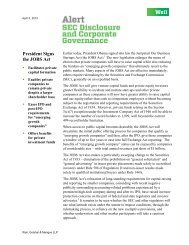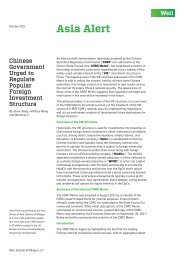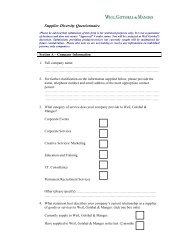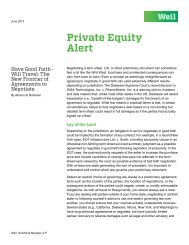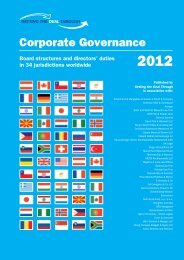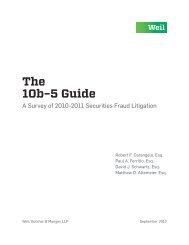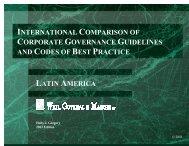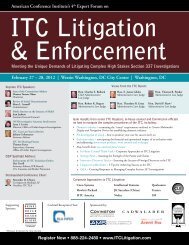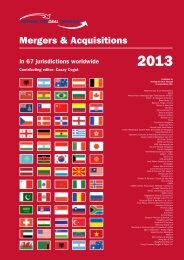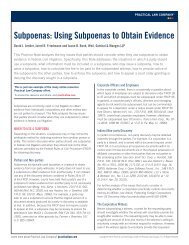Download PDF - Weil, Gotshal & Manges
Download PDF - Weil, Gotshal & Manges
Download PDF - Weil, Gotshal & Manges
Create successful ePaper yourself
Turn your PDF publications into a flip-book with our unique Google optimized e-Paper software.
67 Indirect compensation includes payments to spouses, minor children or stepchildren and children or stepchildren<br />
sharing a home with the audit committee member, as well as payments accepted by an entity which provides<br />
accounting, consulting, legal, investment banking or financial advisory services to the company and of which the<br />
audit committee member is a partner, member, an officer such as a managing director or an executive officer, or<br />
occupies a similar position (except limited partners, non-managing members and those occupying similar positions).<br />
Other senior level positions, such as where the director is “of counsel” at a law firm that provides services to the<br />
company, may also be problematic.<br />
68 A director who has been designated by an affiliate (such as a significant shareholder) to serve on a board would<br />
not, without more, be prohibited from audit committee service. However, such a designee would likely not be<br />
independent for audit committee purposes if he or she is required to vote as directed by the affiliate (for example,<br />
pursuant to a shareholders’ agreement).<br />
69 Also exempt from the “affiliated person” requirement is an audit committee member that sits on the board of<br />
directors of both a listed issuer and an affiliate of the listed issuer, if the audit committee member otherwise meets<br />
the independence requirements for both the issuer and the affiliate. For example, a director should be able to sit on<br />
the audit committees of both a listed parent and a listed subsidiary. It is recommended that a company disclose in its<br />
annual meeting proxy statement (or, if the company does not file an annual meeting proxy statement, in its annual<br />
report) if any audit committee member has been determined by the company’s board to be independent but falls<br />
outside of the safe harbor provisions of Rule 10A-3(e)(1)(ii).<br />
70 SEC Release No. 34-64545 (May 25, 2011). The SEC’s new whistleblower bounty program is administered by<br />
the Office of the Whistleblower residing within the Division of Enforcement. Under this program, an eligible<br />
individual (but not a corporation or other entity) may receive a cash award from a special SEC fund ranging from<br />
10% to 30% of the total amount of monetary sanctions, in excess of $1 million, recovered by the SEC in a civil<br />
judicial or administrative action. An eligible whistleblower also may receive a cash award based on monetary<br />
sanctions collected by other regulatory or law-enforcement authorities in a “related action,” including fines and<br />
penalties imposed in a federal criminal prosecution brought by the U.S. Department of Justice. To recover, a<br />
whistleblower must “voluntarily” provide, in accordance with specific rules, “original information” about a violation<br />
of the federal securities laws that has occurred, is ongoing or is about to occur and that ultimately “leads to<br />
successful enforcement action.” While previously the SEC could only offer financial incentives to whistleblowers<br />
in the area of insider trading, the new whistleblower program provides bounties for information relating to any<br />
violation of the federal securities laws, including the Foreign Corrupt Practices Act.<br />
71 NYSE Listed Company Manual Section 303A.07(a). If the audit committee’s membership falls below three<br />
members, the listed company ceases to comply with the NYSE listing standards and must give notice thereof to the<br />
NYSE. An Item 3.01 Form 8-K report must also be filed with the SEC upon such notice being given. The listed<br />
company is subject to delisting in accordance with the NYSE’s delisting procedure but generally an opportunity to<br />
cure the non-compliance will be provided. See NYSE Listed Company Manual Sections 801.00, 802.01(c), 802.02.<br />
72 Nasdaq Equity Rule 5605(c)(2)(A). If the audit committee’s membership falls below three members, the listed<br />
company ceases to comply with Nasdaq’s listing requirements and must give notice thereof to Nasdaq. An Item<br />
3.01 Form 8-K report must also be filed with the SEC. However, if there is only one vacancy, the company is<br />
provided a cure period extending until the earlier of its next annual shareholders meeting or one year to come into<br />
compliance; provided, however, that the company shall have a minimum of 180 days to fill the vacancy. If an audit<br />
committee member ceases to be independent “for reasons outside the member’s reasonable control,” the listed<br />
company must likewise give notice of such event and the member may remain on the committee for the same time<br />
period (but without a 180 day minimum period), and the listed company will be considered in compliance with the<br />
listing requirements for such period. However, if this provision is being relied upon, the cure period for dealing<br />
with a vacancy may not also be relied upon.<br />
73 NYSE Listed Company Manual Sections 303A.06, 303A.07(a).<br />
<strong>Weil</strong>, <strong>Gotshal</strong> & <strong>Manges</strong> LLP 53<br />
US_ACTIVE:\44182171\7\99980.0865



